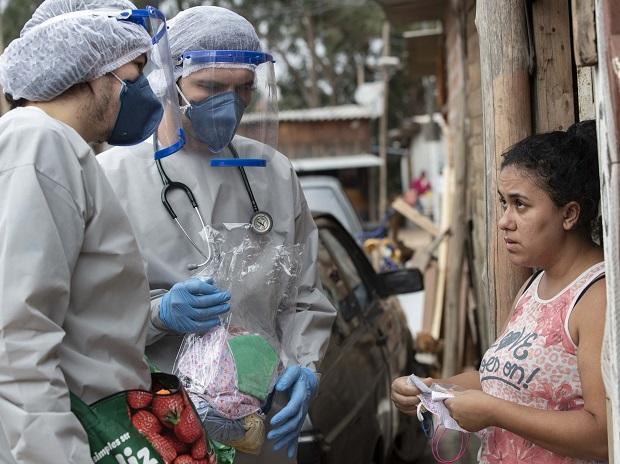Brazil now has the world’s second-highest coronavirus death count, surpassing the UK. The country reported 909 new deaths on Friday bringing the total death count to 41,828. Also, a new study showed the illness may be far more widespread in Brazil than official data suggests. Researchers at the University of Pelotas in southern Brazil estimate there are six unreported cases for every one confirmed diagnosis. Read more here
Let’s look at the global statistics:
Total confirmed cases: 7,651,175
Change over yesterday: 136,616
Total deaths: 425,869
Total recovered: 3,630,280
Nations hit with most cases: US (2,048,986), Brazil (828,810), Russia (510,761), India (308,916) and UK (294,402)
Source: Johns Hopkins Coronavirus Research Center
Coronavirus hitting Americas hardest, says UN: The Americas are bearing the brunt of the global coronavirus pandemic at present, the WHO said Friday, with North and South America currently having four of the 10 worst hit countries in the world. Read more here
Three European airlines sue UK govt over self-isolation rules: Three of Europe’s biggest airlines —British Airways, EasyJet Plc and Ryanair Holdings —teamed up to sue the UK government over plans to force visitors to self-isolate for 14 days. They want only travellers from “high-risk” countries be asked to self-isolate. Read more here
Formula One cancels some races in 2020 season: Formula One has cancelled races in Singapore, Japan and Azerbaijan for the 2020 season due to the coronavirus pandemic. At least five of 22 races have been scrapped, including races in Monaco and Australia. A few others, including races in Bahrain, Vietnam and China, have been postponed. Read more here
After easing lockdown, Thailand may allow some international travel: Thailand is considering travel bubbles with China, Hong Kong, Japan, South Korea, Taiwan, Vietnam, Laos, Myanmar, Cambodia, Australia, New Zealand, and some countries in the Middle East. Read more here
Specials
Most patients in Africa will have to recover at home: The continent accounts for less than 5 per cent of the 7.6 million confirmed infections globally. Spending on healthcare in Africa is about 1 per cent of the global total, leaving hospitals ill-equipped to deal with the surge. Data from South Africa shows about 10 per cent of those diagnosed with the virus require hospitalisation. The World Health Organization estimates as many as 190,000 of Africa’s 1.3 billion people could die in the pandemic’s first year if containment measures fail. It took 98 days to diagnose the first 100,000 cases in Africa and just 18 days to reach the 200,000 mark —a surge that in part reflects an increase in testing. Read more here
Pandemic may reverse two decades progress in reducing child labour: Some 94 million fewer children have been engaged in child labour since 2000, but the pandemic may upend that progress as parents losing jobs can push their children into often hazardous and exploitative work, said a joint report by International Labour Organisation and Unicef. It noted: “In times of crisis, child labour becomes a coping mechanism for many families. As poverty rises, schools close and the availability of social services decreases, more children are pushed into the workforce.” Read more here
In the US, black-owned businesses hit harder by the coronavirus crisis: The number of active business owners in the US fell 22 per cent from February to April; the drop for black businesses was 41 per cent, according to Stanford Institute of Economic Policy Research. Even before the pandemic, the yawning racial wealth gap and persistent disparities in lending created a situation whereby the median black business in America had a fifth of the revenue of the median white-owned company. Read more here
As lockdowns end, people are experiencing "re-entry anxiety”: There are two distinct types of re-entry anxiety. Some people are anxious because they have a “lurking fear” of catching or spreading Covid-19, while others have fallen out of practice socialising and are finding it difficult to resume. Both types of anxiety are likely driven by uncertainty and a fear of unknown harm. Ambiguous and ever-changing public-health advice likely doesn’t help, either. If you’re struggling to find the right balance, try these expert-backed tips for combating re-entry anxiety. Read here
Watch:
Domestic abuse is a "shadow pandemic" alongside Covid-19, according to the UN. They say cases are rising as women are trapped at home with their abusers. BBC finds out how women in four parts of the world have been taking action in their own communities.
